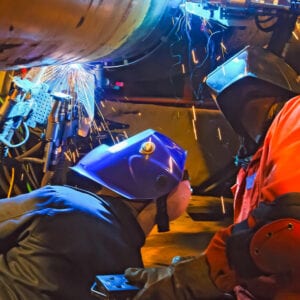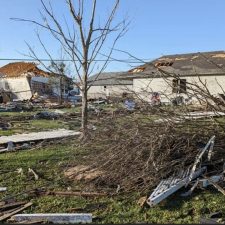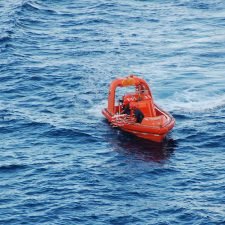
Industry investigations show that the underwater welding death rate has a high fatality rate estimated to be around 15%, making it 1,000 times more dangerous than working as a police officer.
In fact:
That’s not mentioning the severe and permanent injuries the workers suffer.
Underwater welding jobs offer the most attractive salaries because the field of work is inherently dangerous, with welders facing long-term health issues and fatalities.
While the Bureau of Labor Statistics does not keep track of underwater welding fatality rates, a few studies are ranking this maritime job as American’s deadliest occupation.
The work requires divers to have extensive training and experience to follow specific safety protocols before and while performing underwater tasks. In addition to receiving highly specialized training, welders should be closely supervised and use appropriate, well-maintained equipment.
Common Reasons for Underwater Welding Deaths
Several risks are attributed to the underwater welding death rate. Our aim isn’t to sound gloomy, but it’s a great idea to be aware of the dangers you face whenever you’re on the job.
With that…
Below are some of the biggest risks of underwater welding.
- Electrocution: Suffering electric shock while underwater can be fatal. Electrocution happens, especially when using welding equipment not sufficiently adapted to work underwater. All the workpieces must be waterproof and properly insulated.
- Hypothermia: The cold temperatures underwater can conduct heat away from the body. If a person remains submerged for an extended period, they could experience metabolic issues or organ failure in extreme cases. As a safety measure, underwater welders should always wear a properly insulated rubber wetsuit.
- Drowning: This can happen to even the most experienced underwater welders with all the proper equipment. The differential pressures present a unique risk to divers, as they are not easy to detect. Once you become trapped in the flow, it becomes hard to escape. Sometimes, drowning can be caused by poorly-maintained or old gear, such as an oxygen tank, mask, or hose. The workers can get entangled or pinned by their equipment when visibility drops as they go deeper into the water.
- Explosions: Numerous gas pockets may be formed underwater if hydrogen and oxygen combine. The gas pockets can explode, leading to severe injuries or death.
- Decompression sickness: When an underwater welder dives too fast between pressure zones, they face a risk of inhaling harmful gases. Too much exposure to the gases can be fatal.
Underwater Welding Deaths A Year
According to Occupation Safety and Health Administration (OSHA), the U.S records an average of 6 to 13 commercial dive fatalities every year.
However, these statistics are nowhere up to date. Considering the OSHA requirements for diving activities were updated way back in 1978, the fatality rate may be higher as the number of operations and underwater welders have increased over the years.
While there have been a lot of changes in technology, equipment, and safety standards since then, providing the most recent statistics can help shed more light on the industry.
Stakeholders can, in turn, implement extra measures as needed to reduce the rate of accidents.
Contact a Maritime Accident Lawyer
If you have been injured or lost a loved one in an underwater welding accident, call (504) 564-7342 to speak with a offshore accident lawyer at The Mahone Firm. We offer free consultations to help you understand your case and possible next options.






